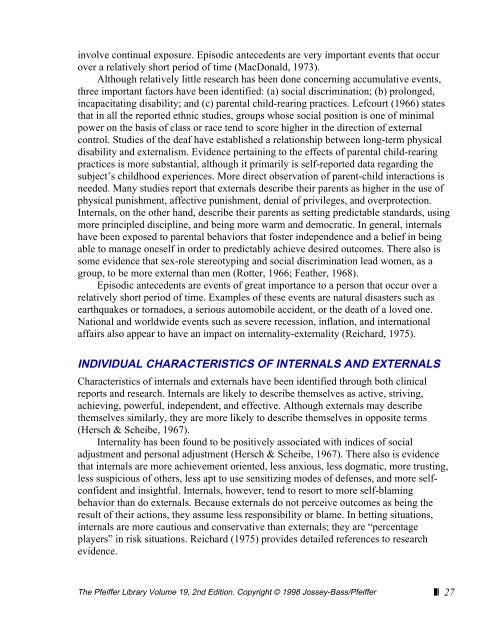motivational analysis of organizations
motivational analysis of organizations
motivational analysis of organizations
You also want an ePaper? Increase the reach of your titles
YUMPU automatically turns print PDFs into web optimized ePapers that Google loves.
involve continual exposure. Episodic antecedents are very important events that occur<br />
over a relatively short period <strong>of</strong> time (MacDonald, 1973).<br />
Although relatively little research has been done concerning accumulative events,<br />
three important factors have been identified: (a) social discrimination; (b) prolonged,<br />
incapacitating disability; and (c) parental child-rearing practices. Lefcourt (1966) states<br />
that in all the reported ethnic studies, groups whose social position is one <strong>of</strong> minimal<br />
power on the basis <strong>of</strong> class or race tend to score higher in the direction <strong>of</strong> external<br />
control. Studies <strong>of</strong> the deaf have established a relationship between long-term physical<br />
disability and externalism. Evidence pertaining to the effects <strong>of</strong> parental child-rearing<br />
practices is more substantial, although it primarily is self-reported data regarding the<br />
subject’s childhood experiences. More direct observation <strong>of</strong> parent-child interactions is<br />
needed. Many studies report that externals describe their parents as higher in the use <strong>of</strong><br />
physical punishment, affective punishment, denial <strong>of</strong> privileges, and overprotection.<br />
Internals, on the other hand, describe their parents as setting predictable standards, using<br />
more principled discipline, and being more warm and democratic. In general, internals<br />
have been exposed to parental behaviors that foster independence and a belief in being<br />
able to manage oneself in order to predictably achieve desired outcomes. There also is<br />
some evidence that sex-role stereotyping and social discrimination lead women, as a<br />
group, to be more external than men (Rotter, 1966; Feather, 1968).<br />
Episodic antecedents are events <strong>of</strong> great importance to a person that occur over a<br />
relatively short period <strong>of</strong> time. Examples <strong>of</strong> these events are natural disasters such as<br />
earthquakes or tornadoes, a serious automobile accident, or the death <strong>of</strong> a loved one.<br />
National and worldwide events such as severe recession, inflation, and international<br />
affairs also appear to have an impact on internality-externality (Reichard, 1975).<br />
INDIVIDUAL CHARACTERISTICS OF INTERNALS AND EXTERNALS<br />
Characteristics <strong>of</strong> internals and externals have been identified through both clinical<br />
reports and research. Internals are likely to describe themselves as active, striving,<br />
achieving, powerful, independent, and effective. Although externals may describe<br />
themselves similarly, they are more likely to describe themselves in opposite terms<br />
(Hersch & Scheibe, 1967).<br />
Internality has been found to be positively associated with indices <strong>of</strong> social<br />
adjustment and personal adjustment (Hersch & Scheibe, 1967). There also is evidence<br />
that internals are more achievement oriented, less anxious, less dogmatic, more trusting,<br />
less suspicious <strong>of</strong> others, less apt to use sensitizing modes <strong>of</strong> defenses, and more selfconfident<br />
and insightful. Internals, however, tend to resort to more self-blaming<br />
behavior than do externals. Because externals do not perceive outcomes as being the<br />
result <strong>of</strong> their actions, they assume less responsibility or blame. In betting situations,<br />
internals are more cautious and conservative than externals; they are “percentage<br />
players” in risk situations. Reichard (1975) provides detailed references to research<br />
evidence.<br />
The Pfeiffer Library Volume 19, 2nd Edition. Copyright © 1998 Jossey-Bass/Pfeiffer ❚❘ 27

















